
Ahnaf Chowdhury Niloy, our new graduate associate, has joined the lab—welcome! 🔗
August 19, 2025
We are excited to welcome a new Graduate Research Associate to our lab!
Ahnaf Chowdhury Niloy is a Ph.D. student in the College of Education and Human Development at Georgia State University (GSU) and has been awarded the Dean’s Research Doctoral Fellowship for 2025–2026. He holds an MBA from Bangladesh University of Professionals and a BBA from East West University. Before beginning his doctoral studies, Ahnaf gained professional experience at The Coca-Cola Company in Bangladesh and at the global Big Four accounting and consulting firm KPMG.
His experimental research on the behavioral relationship between AI usage and creativity has received international attention, with features in outlets such as CNN and The Wall Street Journal. His primary research interests include AI-mediated learning and the strategic management of technology.
Welcome, Ahnaf!

A virtual workshop titled “AI-Scaffolded Pre-Classroom Learning with SMART” was held. 🔗
August 1, 2025
On July 25, 2025, our research team hosted a virtual workshop titled AI-Scaffolded Pre-Classroom Learning with SMART, part of the NSF-funded IUSE (Improving Undergraduate STEM Education) project.
Held via WebEx, this 90-minute interactive session brought together faculty members from the Department of Physics and Astronomy at Georgia State University (GSU) and Perimeter College. The workshop explored how AI-supported tools can enhance students’ engagement and conceptual understanding in Introductory Physics I and II courses.
Dr. Min Kyu Kim, Principal Investigator, opened the session by introducing the SMART system, an AI-powered tool that supports pre-class preparation through summarization tasks.
Seora Kim followed with a live demonstration, walking participants through how students submit their summaries, receive automated feedback on missing concepts and connections, and revise their work using interactive concept maps.
Dr. Mohamed Shameer Abdeen, Co-Principal Investigator, shared practical strategies for integrating SMART into physics courses. He emphasized SMART’s alignment with existing teaching workflows and highlighted benefits such as deeper in-class discussions, improved reading habits, and earlier detection of student misconceptions.
Next, Hyunkyu Han presented findings from recent pilot deployments. The results showed that students who revised their summaries using SMART’s feedback achieved stronger alignment with expert models and performed better on quizzes, homework, and midterms. These gains were observed consistently across gender and ethnicity, demonstrating the tool’s broad effectiveness for diverse student populations.
During the hands-on session, Seora Kim and Hyunkyu Han guided participants through SMART’s instructor dashboard. They demonstrated how to review class-wide analytics on commonly missed concepts, monitor individual student revisions, and track learning progress over time.
The workshop also included an open discussion where participants shared ideas for future enhancements such as mobile and voice-input features, better support for equations and diagrams, and more conversational AI responses. Attendees also raised thoughtful questions about feedback precision, motivation through grading incentives, and adaptation for upper-level courses.
Dr. Kim concluded the session with an invitation for further collaboration and a preview of upcoming developments, including multimodal AI features and an expanded shared-assignment library to support course design.
This workshop highlighted SMART’s practical value and future directions in supporting concept learning and engagement in STEM education. We look forward to continued faculty collaboration to refine and expand the system’s impact on student learning.

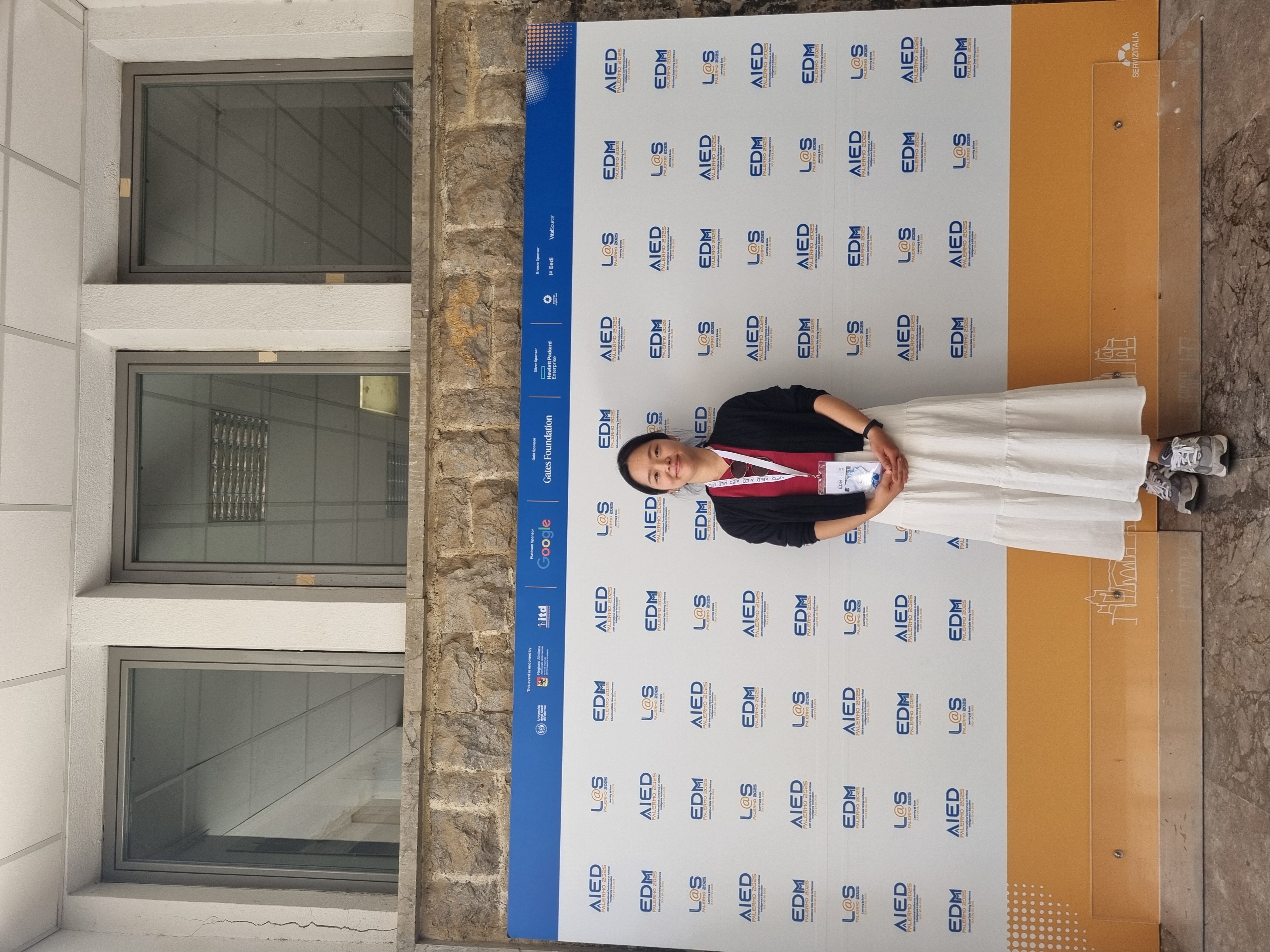
Yoojin Bae was selected to participate in the EDM Workshop. 🔗
July 25
Yoojin Bae was selected to participate in the Workshop on Multimodal Multiparty Learning Analytics (MMLA), held as part of the Educational Data Mining Conference (EDM 2025) from July 20 to July 23 in Palermo, Italy. Her travel was funded by Google.orgthrough the NSF AI Institutes Virtual Organization (AIVO), which provides up to $2,500 for members of NSF AI Institutes to share their work and collaborate on advancing educational AI.
During the workshop, she presented her study on using multimodal large language models to analyze classroom video data from multiple camera angles. Her research demonstrated how a multimodal large language model can combine visual and contextual cues from classroom recordings to detect patterns of engagement, collaboration, and interaction. By generating interpretable insights from video data, her approach aims to help instructors better understand learning processes, particularly in the context of self-regulated learning, and make evidence-based instructional decisions.
She also served as a panelist in a session representing the NSF AI National Institute, AI-ALOE, where the role of multimodal analytics in advancing educational AI was discussed, along with how NSF AI National Institutes are contributing to the field of multimodal analytics.
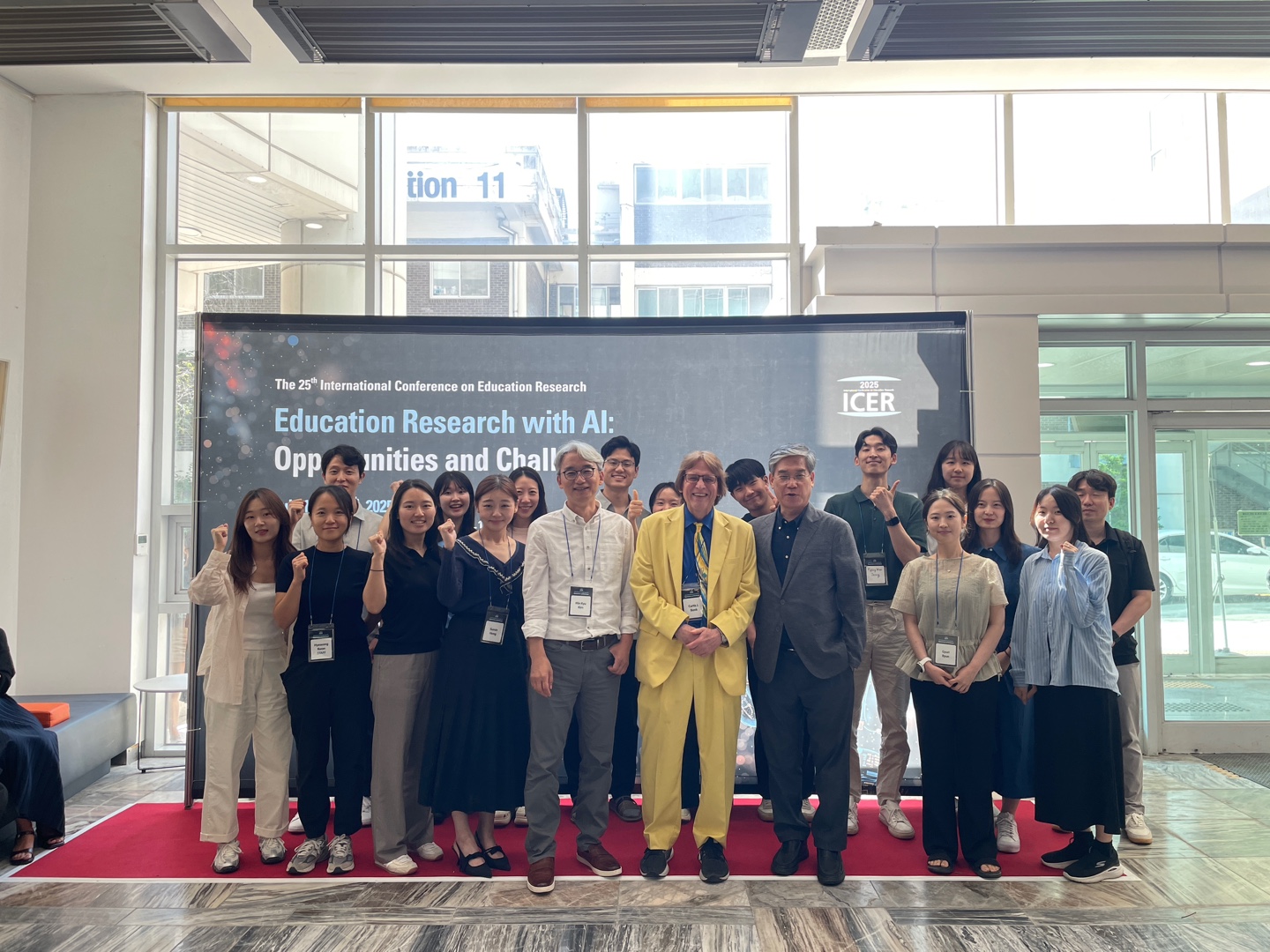
Dr. Min Kyu Kim was invited to deliver two special talks at Seoul National University. 🔗
July 15, 2025
Dr. Min Kyu Kim was invited to deliver two special talks at Seoul National University in Seoul, Korea. On July 8, 2025, he gave a special lecture hosted by the Center for Future Education Innovation and the Educational Technology Research Society, titled “Disruptive AI in Education: Opportunity or Threat for Educational Technology Research?”
In his special lecture, Disruptive AI in Education: Opportunity or Threat for Educational Technology Research?, Dr. Kim discussed how artificial intelligence is reshaping educational technology research. He began by introducing the AI² Research Laboratory’s mission to design AI-based learning environments grounded in learning theory and aimed at maximizing learner capacity. He then outlined major NSF-funded projects, including AI-ALOE, which leverages AI for adult STEM learning through human-AI collaboration; IUSE, which uses AI-scaffolded pre-classroom learning to improve conceptual understanding and self-regulation in physics courses; and SaTC, which develops “Private AI” curricula addressing privacy issues in AI systems.
Moving into the “Disruptive AI” section, Kim reflected on the challenges and opportunities large language models and other AI advances pose to theories of learning, such as shifting from human-centric to post-humanist perspectives and rethinking cognitive architectures. He discussed how AI is altering core educational constructs like expertise, problem-solving, and pedagogy, prompting a reevaluation of established frameworks such as TPACK to include AI-generated content knowledge, AI-powered pedagogy modeling, and new forms of instructional curation. He emphasized that in this new environment, instructional practices must balance product and process, address the blurred lines between cheating and problem solving, and integrate rapid, adaptive development cycles. Drawing on examples from collaborative projects, he illustrated how human-AI teaming—both instructor- and learner-facing—can enrich personalization, multimodal engagement, and adaptive learning. He concluded by positioning disruptive AI not simply as a technological shift, but as a catalyst for reimagining educational research, design, and practice in ways that are theoretically grounded, ethically responsible, and centered on human learning goals.
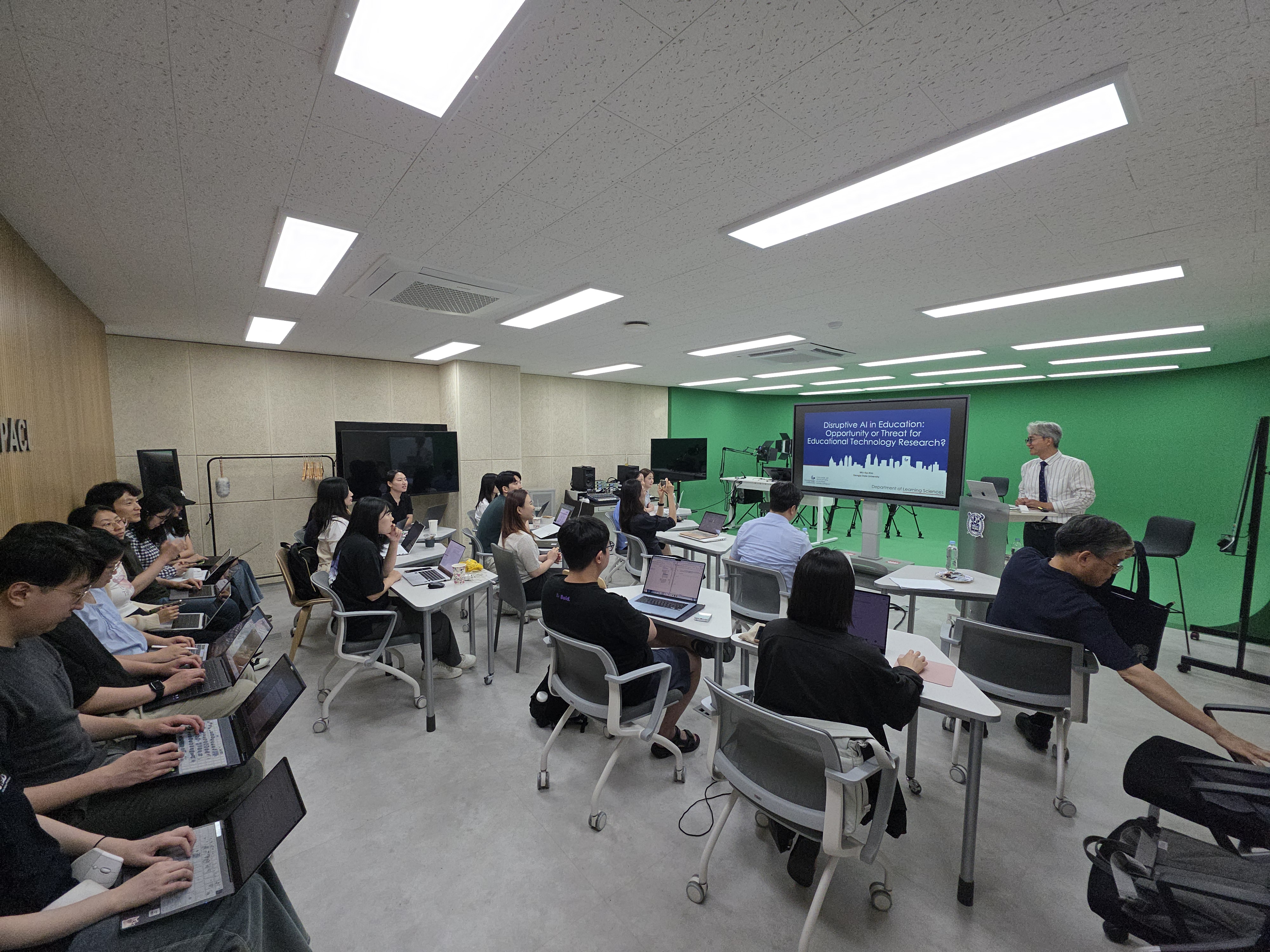
In addition, he was one of eighteen invited speakers at the 25th International Conference on Education Research (ICER), held at Seoul National University from July 10 to 11, 2025. (Link to the ICER 2025) His presentation, “AI for Education: Use-Inspired Approaches and Insights from NSF-Funded AI Institutes,” highlighted cutting-edge research and practical applications of AI in education.
In his ICER 2025 presentation, AI for Education: Use-Inspired Approaches and Insights from NSF-Funded AI Institutes, Dr. Kim explored how use-inspired AI research in education both leverages and advances foundational AI. He framed the talk within the broader objectives of the NSF AI Institutes, emphasizing strategic priorities such as responsible AI research, human-AI collaboration, ethical and societal considerations, AI system safety, open datasets, workforce development, and international cooperation. He profiled five AI in Education Institutes—INVITE, AI4ExceptionalEd, EngageAI, iSAT, and AI-ALOE—describing their work on topics ranging from non-cognitive skills and speech-language services to story-based problem solving, student-AI teaming, and large-scale adult learning.
Drawing on his own work in AI-ALOE, Kim discussed shared approaches in use-inspired AI research: collecting large datasets, developing domain-general models, deploying AI in authentic learning contexts, and designing multimodal AI agents such as classroom video summarization tools. He highlighted the SMART technology project as an example of emerging approaches that integrate generative AI with human-in-the-loop processes, enabling instructor- and learner-AI collaboration to transform and revise learning materials. He demonstrated how this work contributes to learning theory, informs AI design heuristics, and improves educational outcomes—showing, for example, that SMART-supported learners achieved significantly higher concept learning than controls. Concluding, Kim argued that when grounded in robust theory and implemented through iterative, collaborative design, use-inspired AI research can simultaneously advance AI capabilities and transform educational practice in meaningful, measurable ways.
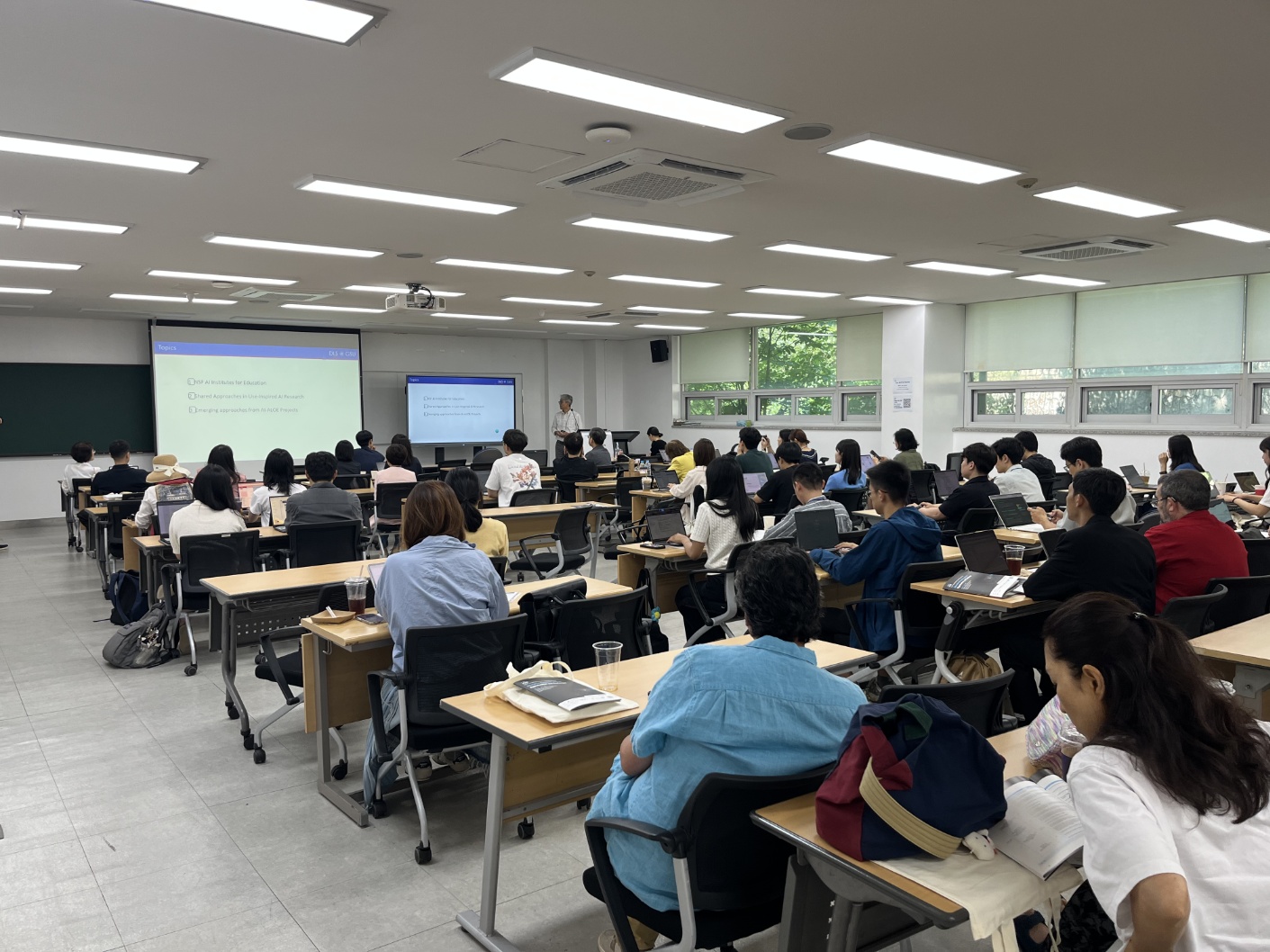
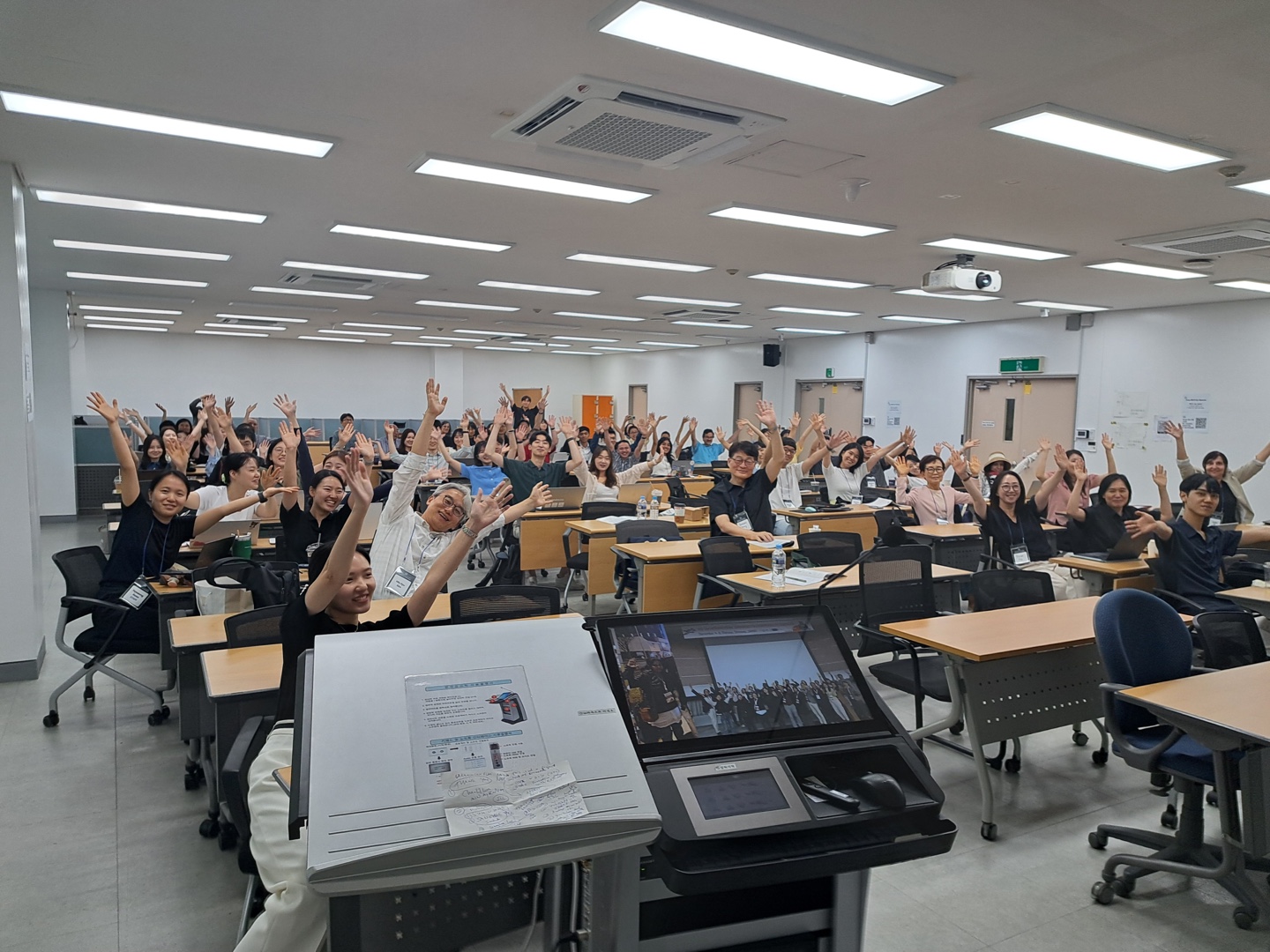
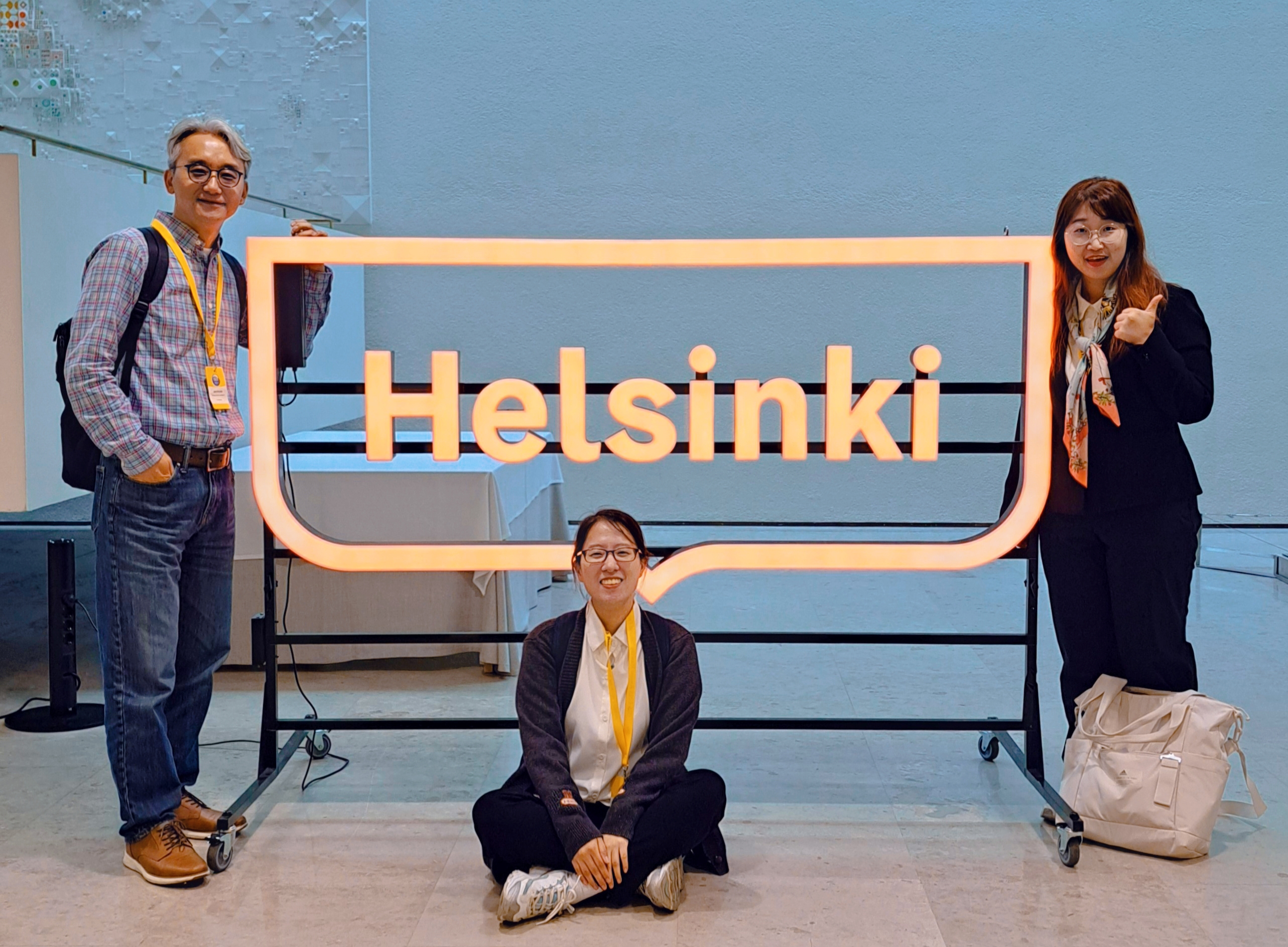
AI2RL Presentations at the 2025 ISLS Annual Meeting 🔗
June 17, 2025
Members of AI2RL attended and presented at the 2025 International Society of the Learning Sciences (ISLS) Annual Meeting in Helsinki, Finland, held from June 10–13. We presented one short paper and two posters, participated in community events such as Coffee with Professors as mentors or mentees, and also served as a hybrid ambassador.

Exploring AI-Generated Expert Models: Instructor Interaction and Learner Perceptions in a Physics Class
Wednesday, June 11th, 10:30 AM to 12:00 PM, U4072 - AI in Higher Education
Presented by Min Kyu Kim
Abstract: Generative Artificial Intelligence (GenAI) offers opportunities for automatically creating expert model summaries, though creating them is demanding, requiring significant time and effort. Using a case study, we explored three types of expert model summaries, generated by human, AI, and human-AI collaboration. A new, AI-augmented expert modeling tool, which supports summarization activities, was deployed. Human-AI interaction, linguistic differences among the summaries, and learners’ perceptions were explored. Data sources included instructor log data, linguistic measures, and a student evaluation survey. Results showed that students preferred AI-generated summaries for their clarity, depth, and coherence, while human-AI collaboration achieved a balance between fluency and accuracy. Findings signify GenAI’s potential to reduce workload but underscore the need to address its limitations.
Digital Literacy in Physical Education: A Systematic Review of Frameworks and Development Areas
Wednesday, June 11th, 4:30 to 6:00 PM, Fabian - ICLS Poster Session 1
Presented by Sua Im
Abstract: This review examines digital literacy in physical education (PE), an underexplored area despite increasing technological integration. We address three key questions: (1) What theoretical frameworks are used? (2) How is digital literacy reported in PE? (3) What areas need further development? A systematic review of 12 studies shows digital literacy in PE is mainly framed through digital literacy and digital competence models. While overall levels were moderate to high, disparities emerged by gender, grade level, and experience. Key barriers include inadequate professional development and a lack of standardized assessment tools. This review highlights the need for targeted training and objective evaluation methods to better capture digital literacy in PE.
Design-Based Research for Scenario-Based, Generative AI-Augmented Simulation in Nursing Education
Thursday, June 12th, 4:45 to 6:15 PM, Agora - ICLS Poster Session 2
Presented by Jinho Kim
Abstract: Simulation-based learning is vital in nursing education but faces scalability and authenticity challenges. This study explores using generative AI as a role-playing agent in nursing simulations. Using a design-based research approach, we developed an evaluation framework and question set to evaluate AI model performance. Findings highlight accurate role-based dialogue but limitations in common-sense reasoning. Recommendations include clearer evaluation criteria, diverse question sets to comprehensively evaluate ambiguity handling, and refining scenarios iteratively for consistency and clarity.
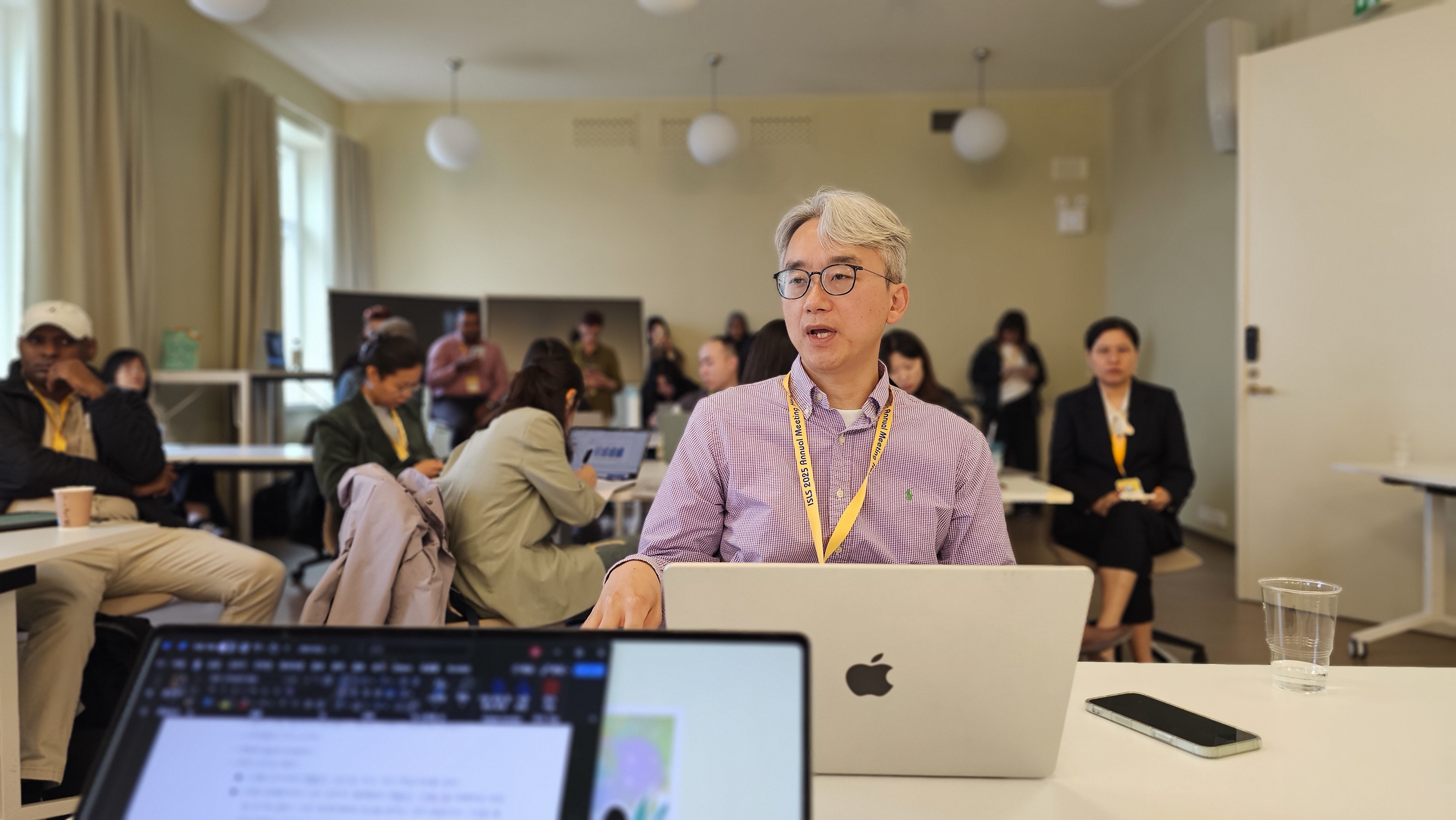
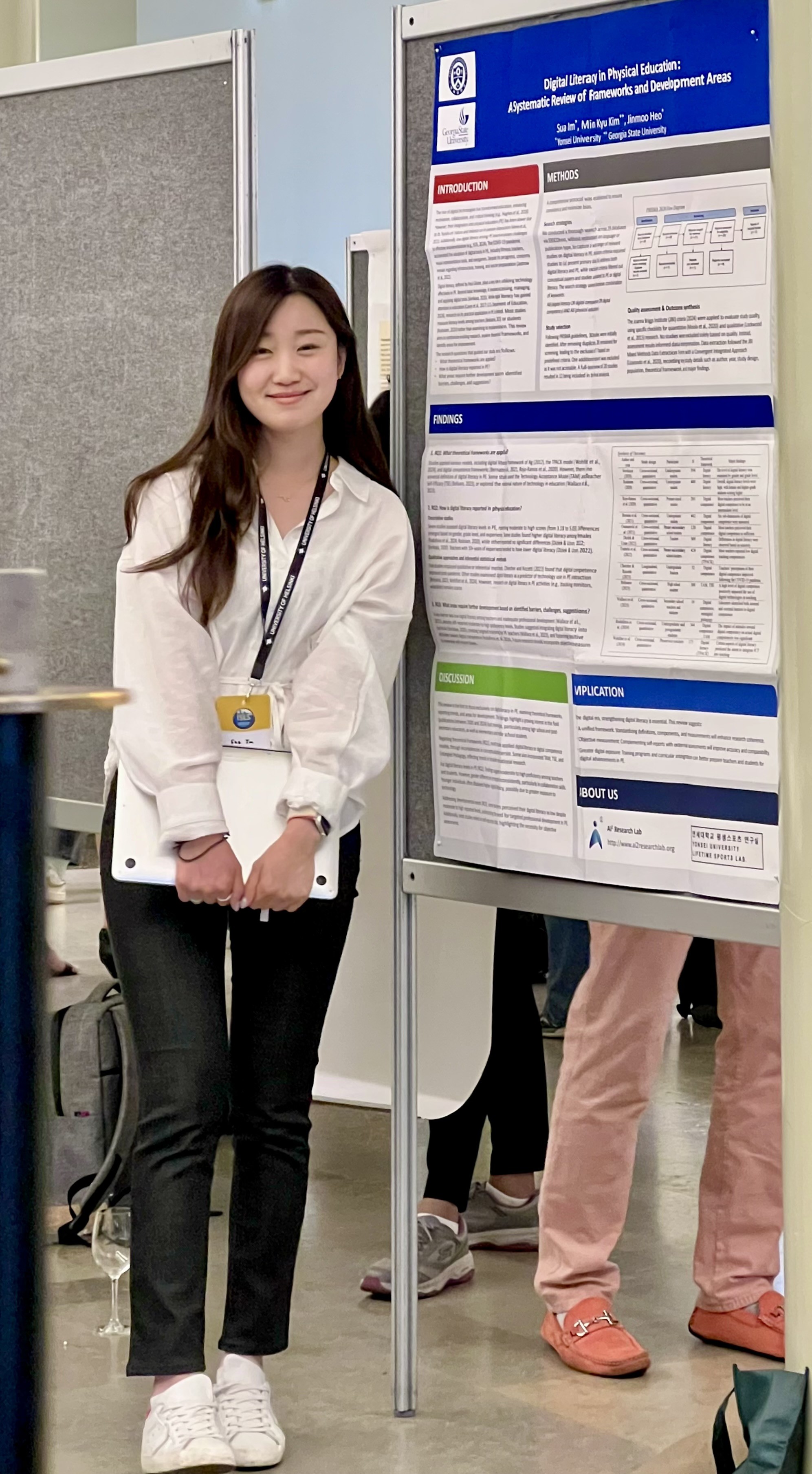
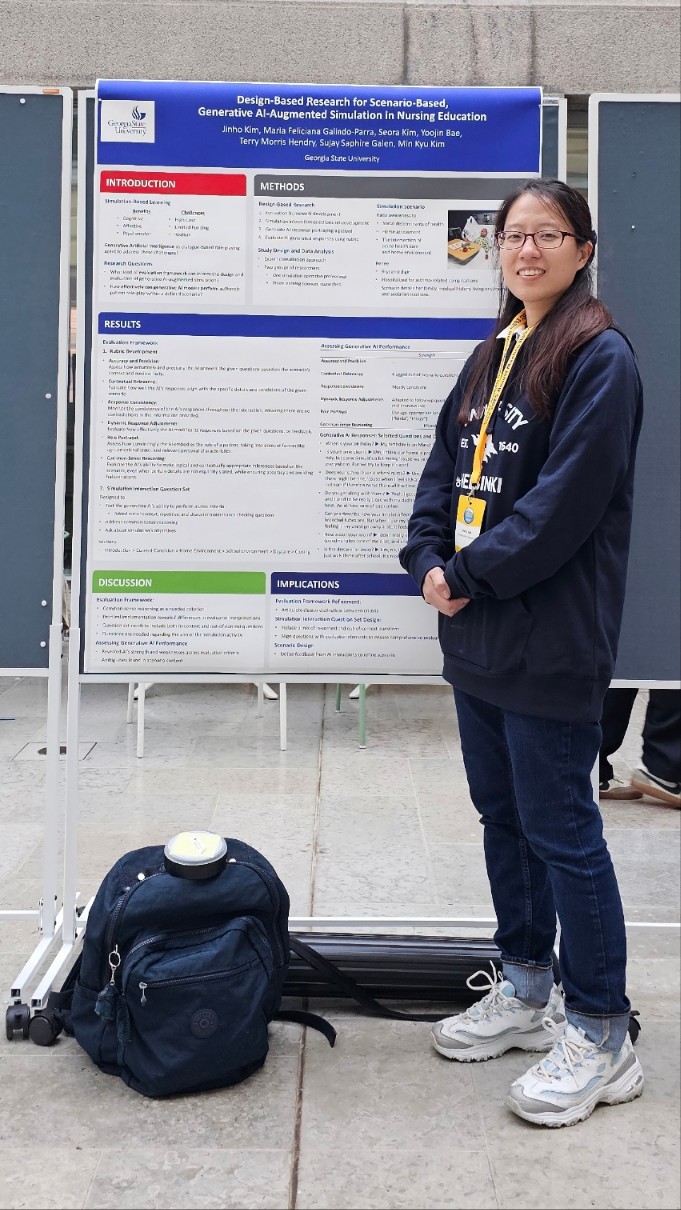
AI-ALOE External Advisory Board Meeting 🔗
May 16, 2025
Our lab attended the AI-ALOE external advisory board (EAB) meeting at the Coda Building, Georgia Tech on May 16. There, our members had multiple presentations as well as posters.
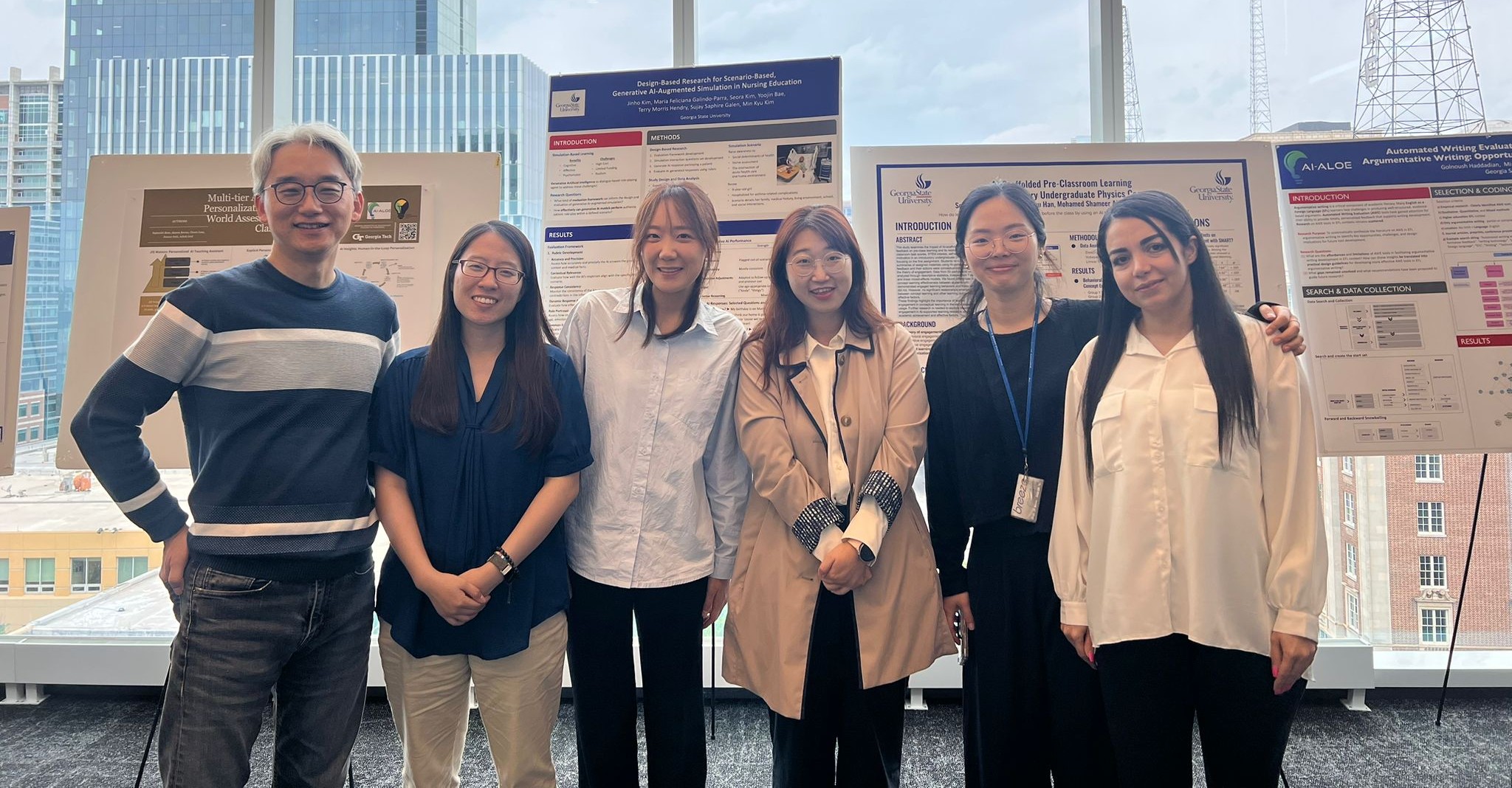
Our first presentation was during the Impact on Learning session, where our AI-ALOE graduate associate, Yoojin Bae shared extending SMART into workforce education. She shared about our deployments expanding to nursing and it related courses, and the results from our case study from experimental setting English courses.
Dr. Min Kyu Kim led the Contributions to Theories of Learning and of AI Agents session as the chair, introducing speakers and facilitating the following discussion. In the same section, our graduate associate, Jinho Kim, also presented on A Theory of Learning, sharing our SMART team’s approach in revisiting and reinterpreting CoI, ICAP, and Self Determination Theory in SMART.
The final presentation was during the Design Heuristics for Building AI Agents for Learning and Education section, where Jinho Kim introduced our top down approach from theory to design guidelines using a whole person approach.

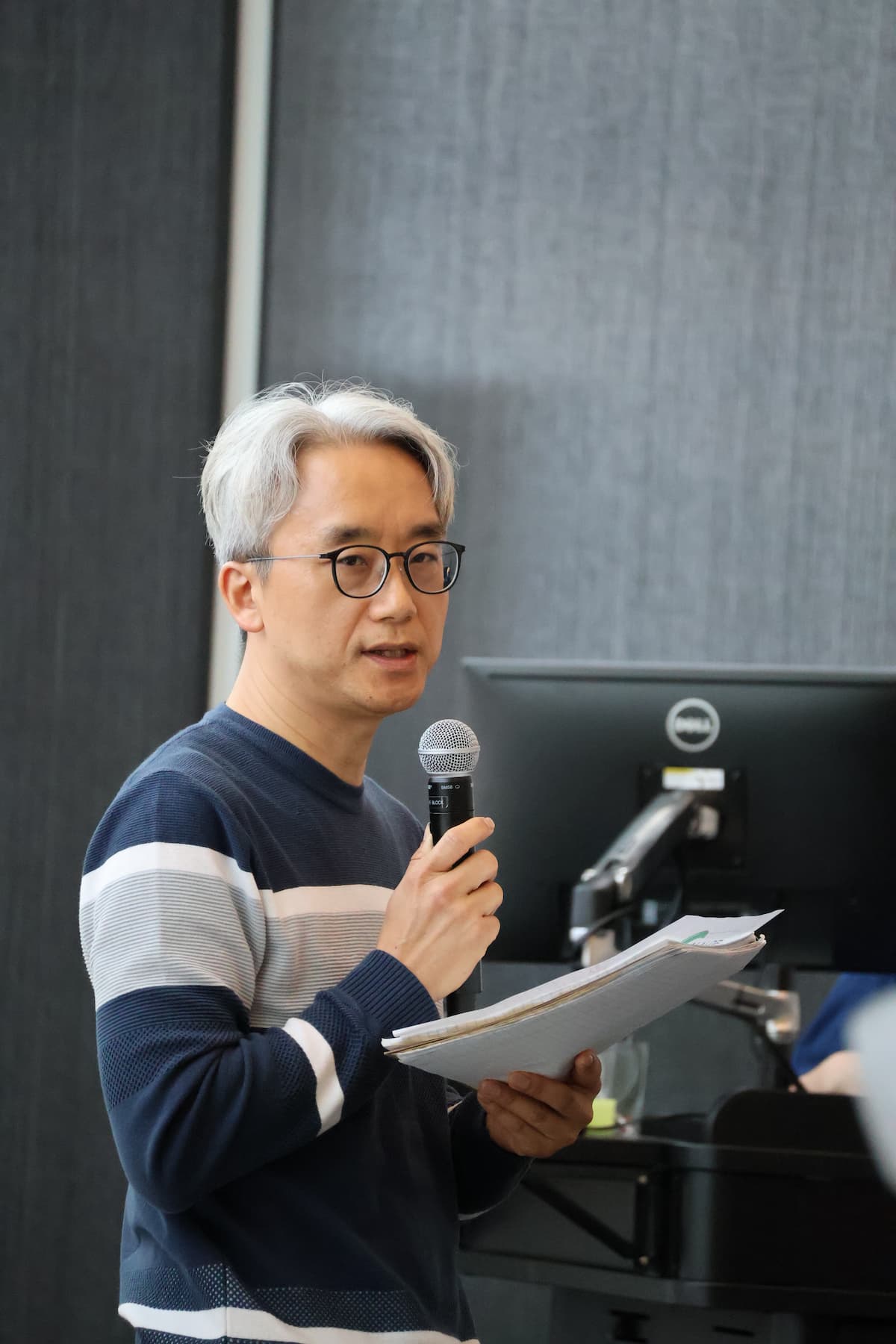
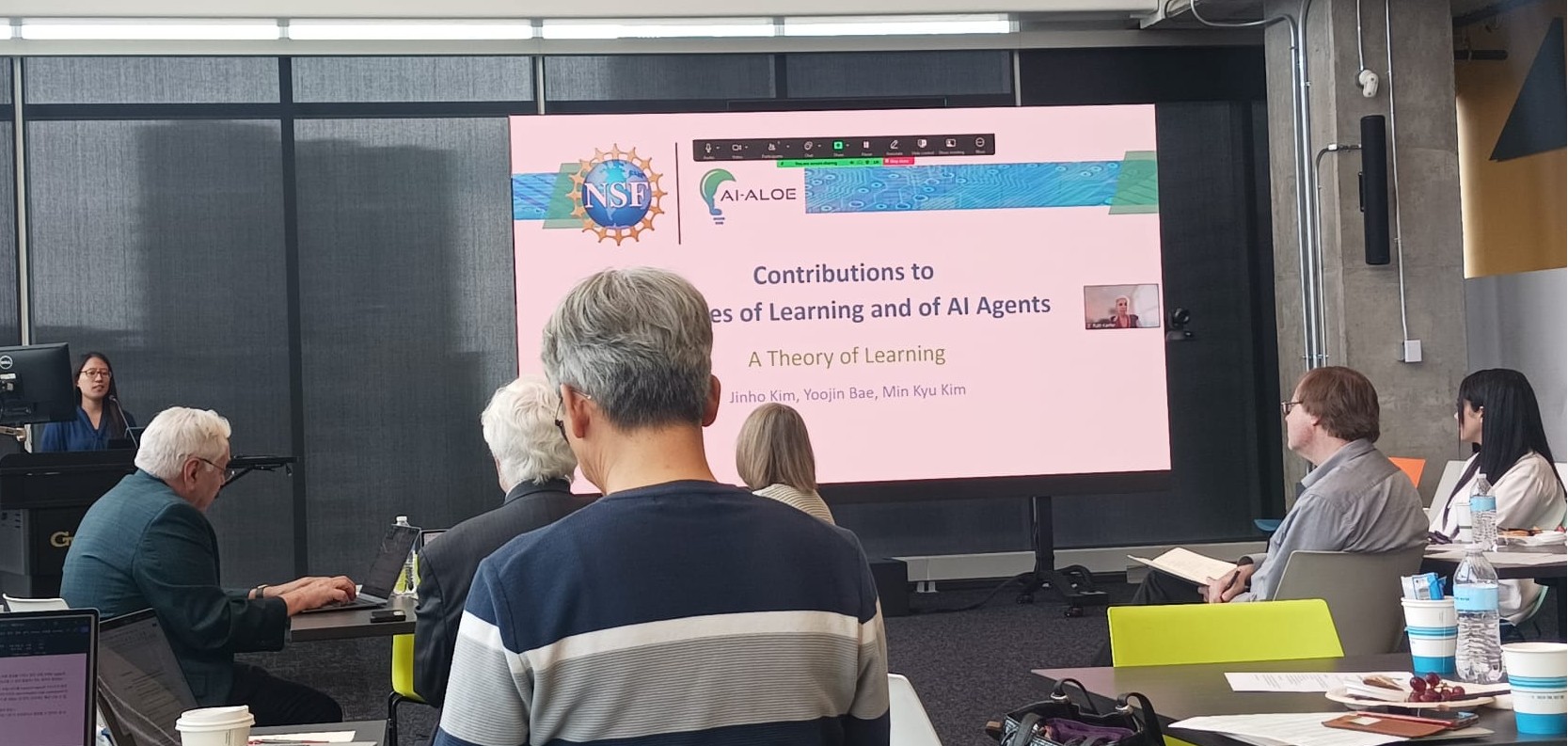
During the poster session, we also had four posters to share.
Automated Writing Evaluation in English and Foreign Language Argumentative Writing: Opportunities, Challenges, and Future Directions
Golnoush Haddadian, Min Kyu Kim, and Nooshin Haddadian
This systematic review investigates the use of Automated Writing Evaluation (AWE) systems in supporting argumentative writing among English as a Foreign Language (EFL) learners. Drawing from publications between 2014 and 2023, the study synthesizes findings from empirical research to identify key features, design principles, and pedagogical implications of AWE tools in EFL contexts. Through rigorous coding and thematic analysis, the review uncovers emerging opportunities, persistent challenges, and gaps in the current literature. Findings underscore the need to align AWE feedback with learners’ higher-level argumentative writing needs (e.g., claim development, evidence integration) rather than focusing primarily on surface-level issues (e.g., grammar, spelling), by embedding personalized learning opportunities within the writing process. The study concludes with recommendations for future research and design guidelines to inform the development of future AWE tools that effectively support argumentative writing.
Design-Based Research for Scenario-Based, Generative AI-Augmented Simulation in Nursing Education
Jinho Kim, Maria Feliciana Galindo-Parra, Seora Kim, Yoojin Bae, Terry Morris Hendry, Sujay Saphire Galen, Min Kyu Kim
Simulation-based learning is vital in nursing education but faces scalability and authenticity challenges. This study explores using generative AI as a role-playing agent in nursing simulations. Using a design-based research approach, we developed an evaluation framework and question set to evaluate AI model performance. Findings highlight accurate role-based dialogue but limitations in common-sense reasoning. Recommendations include clearer evaluation criteria, diverse question sets to comprehensively evaluate ambiguity handling, and refining scenarios iteratively for consistency and clarity.
Cheating or Adapting? Plagiarism Behaviors in AI-Augmented Physics Course
Hyunkyu Han, Golnoush Haddadian, Mohamed Shameer Abdeen, Min Kyu Kim
The integration of artificial intelligence (AI) in education poses challenges and opportunities for academic integrity. This study examines the intersection of plagiarism and learning behaviors in an AI-augmented introductory physics course. Using the Student Mental Model Analyzer for Research and Teaching (SMART), 35 undergraduate students submitted 101 summary revisions, which were analyzed for local and global plagiarism using Copyleaks and Turnitin. Findings reveal that high Global Plagiarism Index (GI) scores, often linked to misconduct, can also indicate meaningful learning behaviors such as conceptual engagement and iterative refinement. Bayesian Linear Mixed-Effects models show GI scores positively correlated with concept similarity and paraphrasing efforts, while multiple revisions were associated with reduced reliance on external sources. Additionally, a case review illustrates how high GI scores may reflect learning progress rather than unethical practices. The results suggest a potential re-interpretation of typical plagiarism indices within the context of AI-augmented summary writing assignments.
AI-Scaffolded Pre-Classroom Learning in an Introductory Undergraduate Physics
Seora Kim, Jinho Kim, Hyunkyu Han, Mohamed Shameer Abdeen, Min Kyu Kim
This study examines the impact of AI-scaffolded formative feedback on pre-class learning and its relationship with classroom task scores, STEM interest, self-efficacy, and motivation in an introductory undergraduate physics course, focusing on the first assignment. Students revised summaries of assigned materials using AI-generated feedback and their actions were conceptualized based on the theory of engagement. Data from 55 participants were analyzed through descriptive statistics, independent T-test, and linear mixed-effects models. We found differences in concept learning effectiveness between students who demonstrated engaged learning behaviors and those who did not. However, no significant relationships emerged between concept learning and other learning outcomes or affective factors. These findings highlight the importance of learner engagement in conceptual learning in the early stage of tool usage. Further research is needed to explore how more engagement in AI-supported learning relates to students’ academic achievement and affective factors.
Overall, the EAB meeting was a chance for us to share our contributions with AI-ALOE, have discussions, and get valuable feedback.
For more information about the External Advisory Board Meeting, please visit the following link: AI-ALOE Hosts External Advisory Board Meeting to Showcase Year-Four Achievements

Lia Haddadian has been awarded the AIVO Fellowship and selected for the QuEST Program 2025 🔗
May 15, 2025
Lia Haddadian, our graduate associate, has been awarded the AIVO Fellowship and selected for the QuEST Program 2025.
The AI Institutes Virtual Organization (AIVO), managed by UC Davis, offers the Graduate Research Fellowship as part of the AI4Ed Summer 2025 Program. Lia will be engaged in this 12-week program from May 7 to August 24, contributing 40 hours per week to AIVO’s AI4Ed initiatives.
In addition, Lia has been selected to participate in the Quantitative Evidence Synthesis Training (QuEST) Program 2025, a highly competitive and fully funded training hosted by the American Institutes for Research® (AIR). This intensive program will be held from August 4–8, 2025, at AIR’s Chicago office and brings together emerging scholars from across the country for hands-on training in advanced methods of quantitative evidence synthesis. Learn more about the QuEST Program here: https://www.air.org/QuEST-for-p3/in-person-training
Yoojin Featured as a Graduate Researcher in the AI-ALOE Spring Newsletter 🔗
May 6, 2025
We are delighted to share that Yoojin Bae, our graduate associate, has been recognized in the AI-ALOE Spring Newsletter!
Featured in the Student Highlights section, Yoojin was acknowledged for her outstanding achievements and contributions to the AI-ALOE project. Her research lies at the intersection of education and computer science, with a focus on leveraging artificial intelligence to support adaptive learning environments. Currently, she is working with multimodal large language models to analyze video data in educational contexts.
Be sure to check out the full newsletter here: AI-ALOE Newsletter
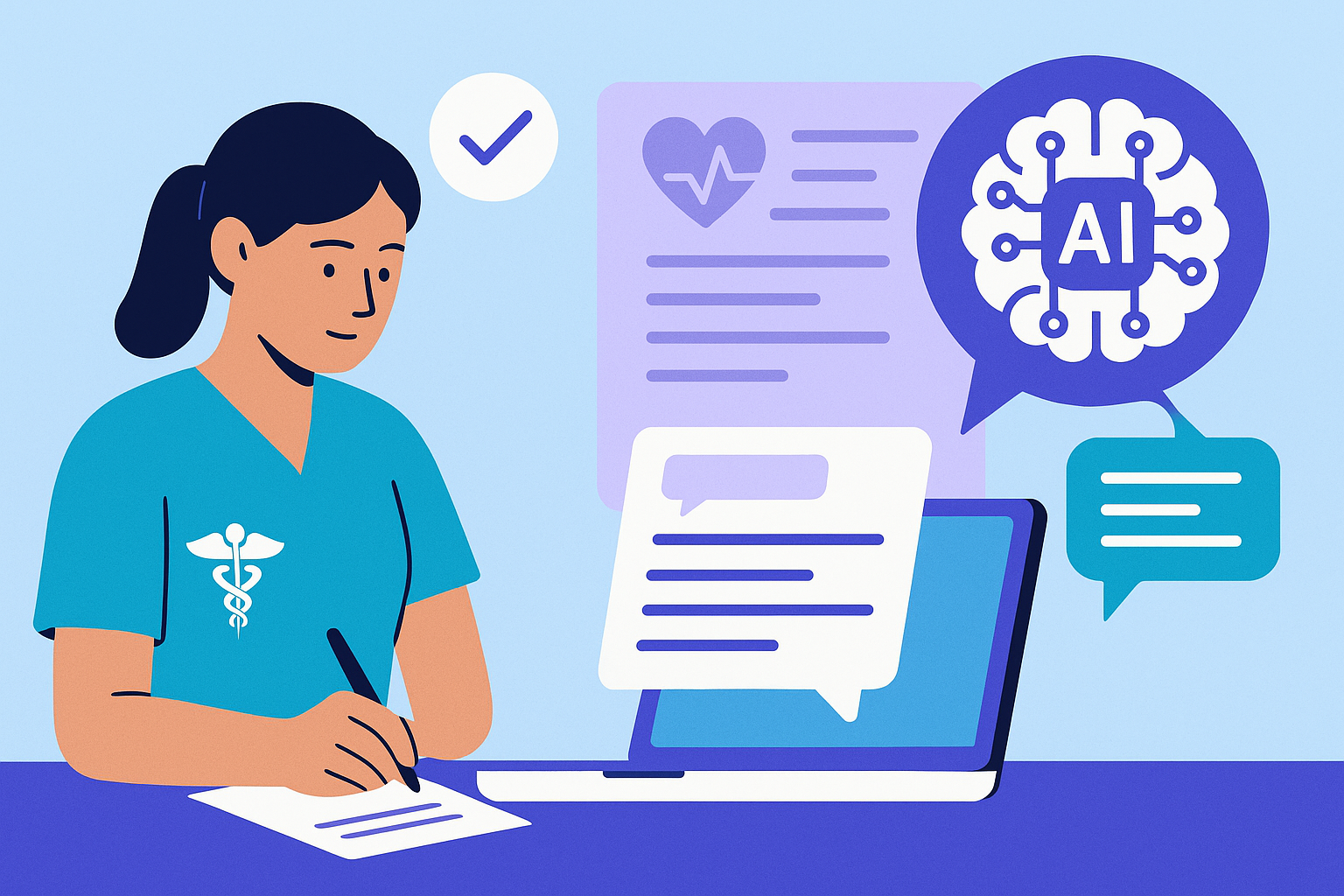
Research Collaboration: AI-Powered Nursing Education 🔗
May 1, 2025
Since Fall 2024, our lab has been collaborating with the School of Nursing at Georgia State University (https://lewis.gsu.edu/nursing/) to integrate AI technologies into both undergraduate and graduate nursing education. Our efforts focus on two key areas: enhancing teaching and learning by embedding AI agents into nursing courses, and developing advanced AI-driven simulations for the Clinical Skills and Simulation Center (https://lewis.gsu.edu/sim-center/) within the Byrdine F. Lewis College of Nursing and Health Professions.
Regarding AI-powered teaching and learning, we have been implementing the SMART system across various courses in the School of Nursing at Georgia State University. We began by applying SMART to Medical Surgical I, an undergraduate course required for third-year nursing students that integrates theoretical instruction with clinical practice. A refined integration involving four SMART assignments was implemented and tested in Spring 2025. Additionally, this Spring semester, we extended the AI deployment to Epidemiology, a graduate-level course focused on conceptual and theoretical content.
Looking ahead to the summer, we plan to implement SMART in both undergraduate and graduate Pathophysiology courses. Our goal is to continue identifying effective strategies for AI integration that support instructors’ teaching practices and enhance students’ learning and engagement. Notably, we will introduce multiple AI tools within the same instructional setting. For instance, we aim to create a confluence of SMART—a knowledge-based AI system—and Jill Watson, a GenAI-powered conversational agent. This dual deployment will allow stakeholders to benefit from SMART’s assignment-specific assessment and feedback features, alongside Jill Watson’s interactive, conversation-based learner support. Ultimately, we hope to explore how these tools can be combined to create a task-oriented, interactive, and engaging concept learning platform that advances nursing education.
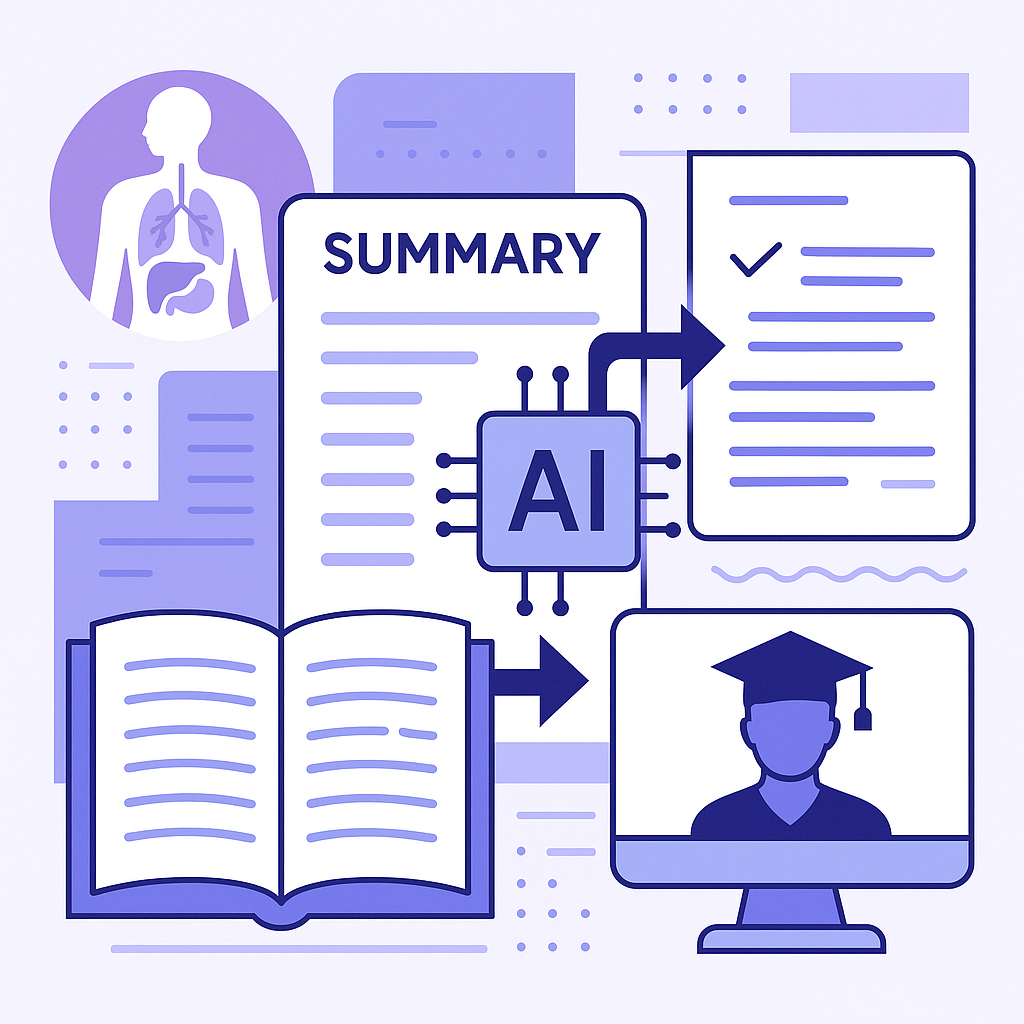
Additionally, we are developing an AI-augmented simulation-based learning platform, tentatively titled The AI-Powered Nursing Simulation Framework (AI-NSF). This effort is a collaboration with the Clinical Skills and Simulation Center (https://lewis.gsu.edu/sim-center/) within the Byrdine F. Lewis College of Nursing and Health Professions and the Future of Learning Lab at Cornell University (https://learning.cis.cornell.edu/). The AI-NSF aims to establish a flexible framework for supporting simulation-based learning through a conversational AI-augmented simulator.
The platform will provide a hybrid simulation environment that connects an online simulator with physical simulation rooms. Within this setup, learners can engage with either a virtual or manikin patient across various clinical scenarios, allowing them to demonstrate and refine their critical thinking, communication, and clinical skills in a realistic, adaptive, and authentic learning context.
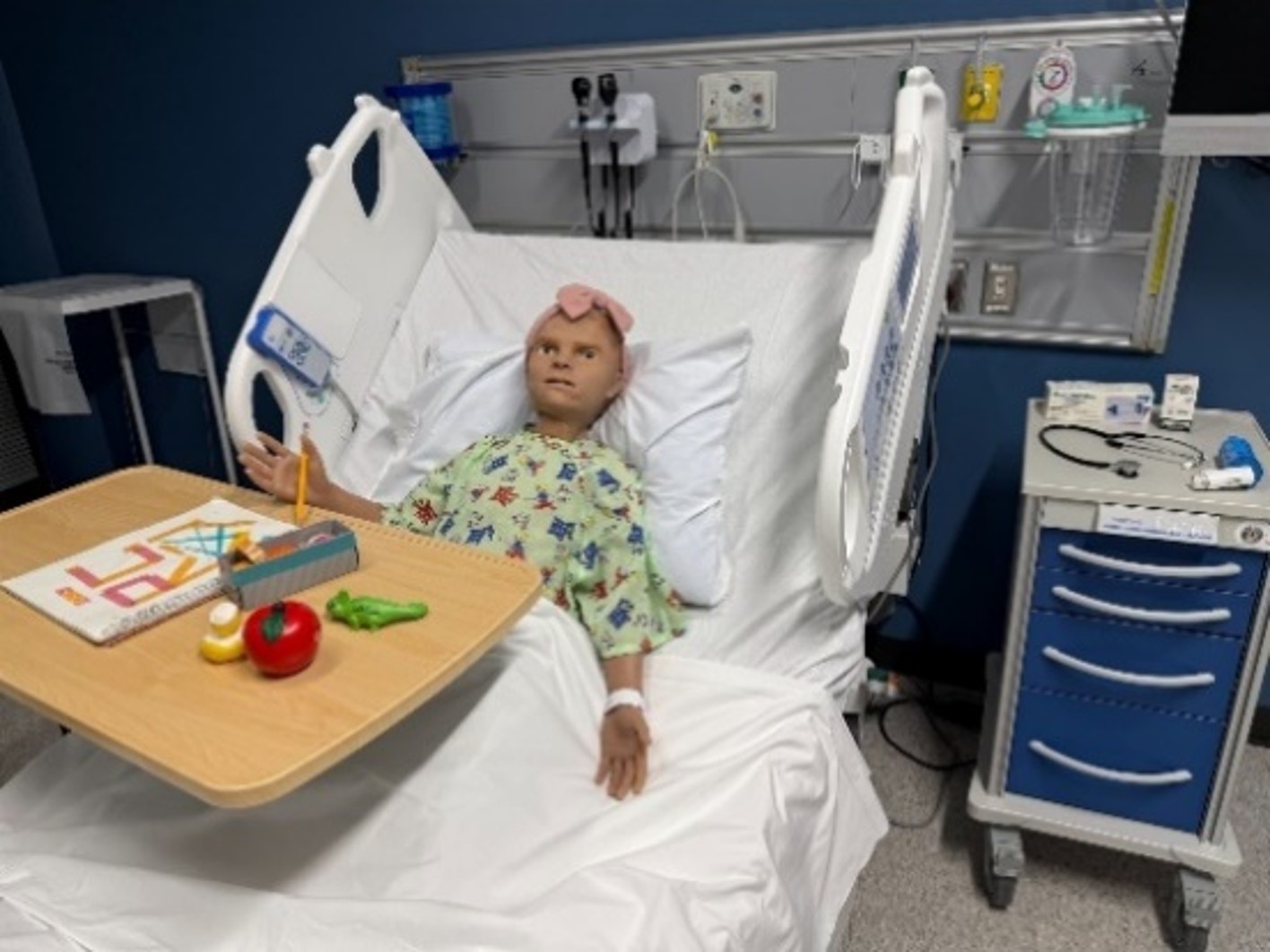
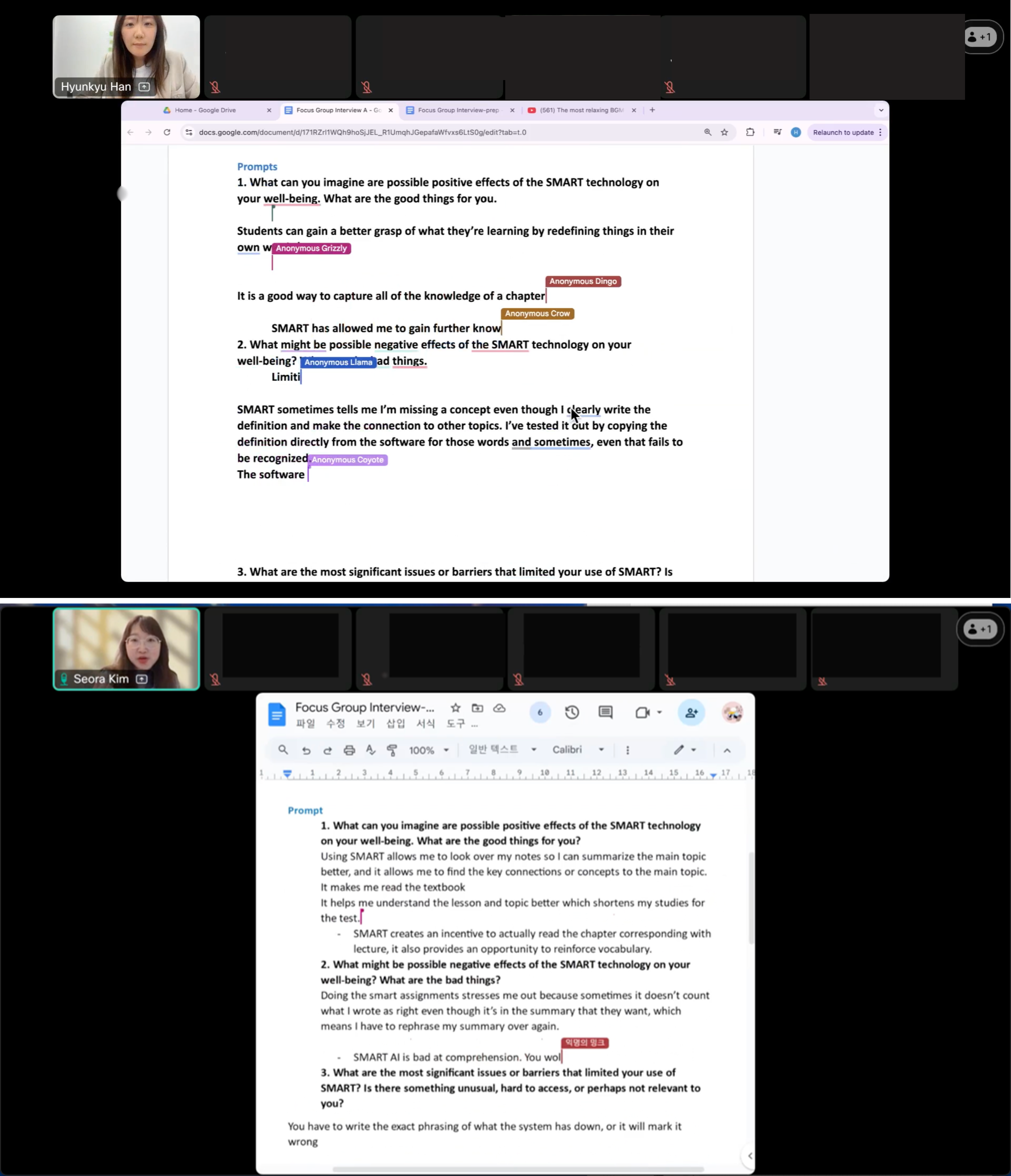
NSF IUSE Project: Focus Group Interview on SMART learning experience in PHYS 1112K 🔗
April 4, 2025
Our research team conducted a focus group interview with 15 students from the Spring 2025 PHYS 1112K course at Georgia State University on April 4th. This session was part of our NSF-IUSE project, “AI-Scaffolded Pre-Classroom Learning for Undergraduate Physics Courses.”
The purpose of the session was to better understand how SMART, an AI-supported formative feedback system, impacted students’ learning and well-being over the course of the semester. In this context, well-being refers to students’ physical, mental, emotional, and social experiences within the learning environment.
Graduate research assistants Hyunkyu Han and Seora Kim facilitated the session. Students were invited to share their perspectives on the positive effects of SMART on learning and well-being, challenges or negative experiences, and barriers to using SMART effectively.
